
“An increasing population means extra demand for water while climate change simultaneously puts a strain on water resources. It is more important than ever for everyone to take care of how they use water.” Water UK
June 2023 has been hot and dry. Another water company has implemented a “hosepipe ban” as campaigns continue to use our precious water supply wisely. It did rain, overnight into Monday 19th June and it rained a good amount which was welcome after such a long dry spell this month. The rainfall this year has varied wildly. February was very dry then March 2023 was very wet for the southern half of Britain, compared to average.
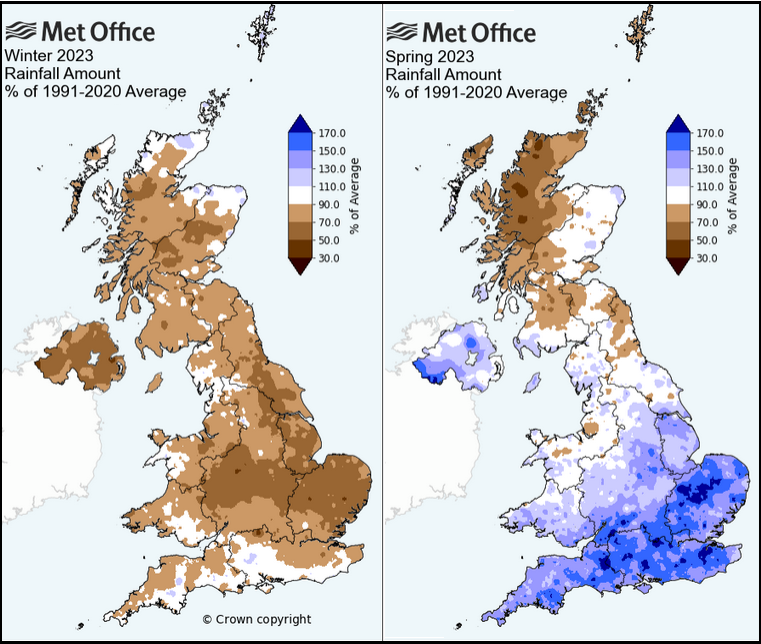 Rainfall patterns this year set against a 3 decade average. Parts of the UK saw a wet spring which was helpful but persistent winter rains are what's needed.
Rainfall patterns this year set against a 3 decade average. Parts of the UK saw a wet spring which was helpful but persistent winter rains are what's needed.
Everyone realises that one hefty downpour is not enough to offset the weeks of dry weather at this time of year, even if the plants and grass look a bit perkier today. The process of clean water coming out of our taps, across the UK, has a complicated back story. There is the obvious, rain falling from the skies. Then runoff into rivers and reservoirs or a more gradual soaking into the ground and aquifers. When the ground is hard and very dry, that runoff can be dramatic and lead to flash flooding, especially after torrential thunderstorms in summer. It then just rushes right away. Our domestic water comes from reservoirs but agriculture often abstracts water from nearby rivers, so both are important.
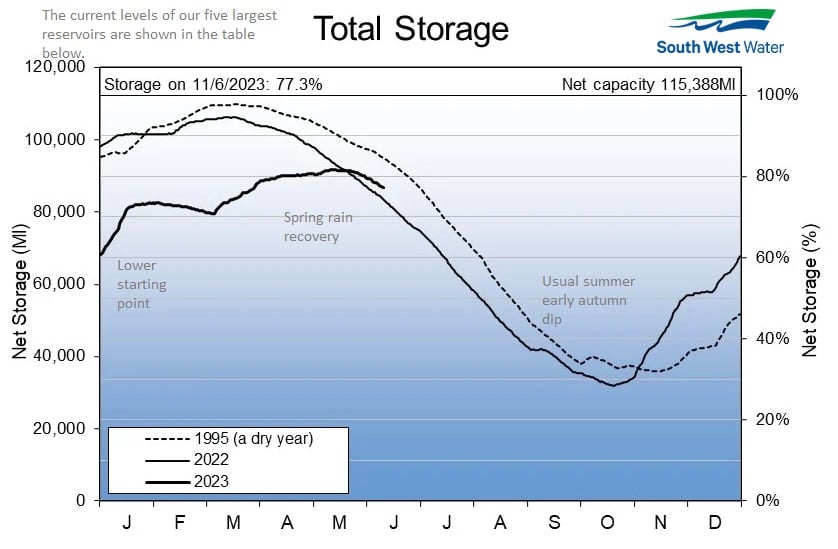
The water that is captured in reservoirs has to be treated and then stored and transported. It is then ready for daytime peaks as the nation showers, has their morning hot beverage or fills water bottle before school and puts on household appliances. On hot days, that demand increases with paddling pools, gardens being watered and people drinking and washing more. In Southeast England, the higher demand outstripped the available water supply and left some people with no water, or low pressure. As we head further into summer restrictions in some areas were needed, hence the ban. This will affect two million people in Kent and Sussex.
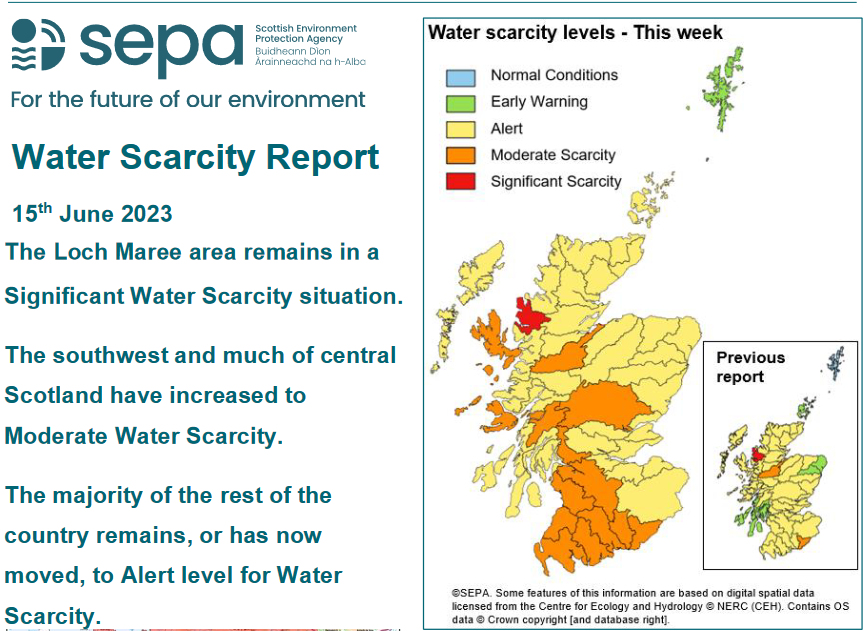
SEPA weekly Water Scarcity report
All of Scotland is now in water scarcity alert, with several areas being in moderate scarcity, even significant scarcity. Significant Water Scarcity is where the average river flows in a region have remained exceptionally low for 30 consecutive days. That hasn’t resulted in hosepipe bans, as the population density isn’t the same as in southeast England. There is advice for water users, particularly around irrigating farmlands and also for managers of golf courses and water abstraction.
Southwest Water started their hosepipe ban back in April 2023 (also known as a Temporary Use Ban). This is across Cornwall and parts of Devon. It is about looking at the available water resources in the region and planning to protect them. Spring and Summer 2022 were very dry. Autumn 22 wetter than average, Winter was dry in the southwest, and then Spring 23 was wet, but it wasn’t enough. The area is still seeing the impact of last year’s exceptionally dry weather, and summer is not a time of major replenishment.
SW Water “Significant and sustained rainfall is needed to help our rivers and reservoirs recover, but your actions and efforts can have a huge impact too. We are asking everyone living or visiting the South West to increase their efforts and do all they can to reduce the amount of water they use.” Something to bear in mind if you are holidaying in the region.
As we head towards the height of summer, these steps are about handling the supply and planning around possible drought. Last summer UK rainfall was low, with many regions, particularly in England, seeing less than half the average rainfall. The Anglian, Thames and Wessex regions all recorded their fifth driest summer in records since 1836 and all of this feeds into the picture for 2023. Wales and SE Scotland were also lacking in rain with exceptionally low river flows as demand surged. Groundwater levels also fell and soil moisture levels were low. There were numerous Hosepipe bans last year, and many areas moved into official drought status.
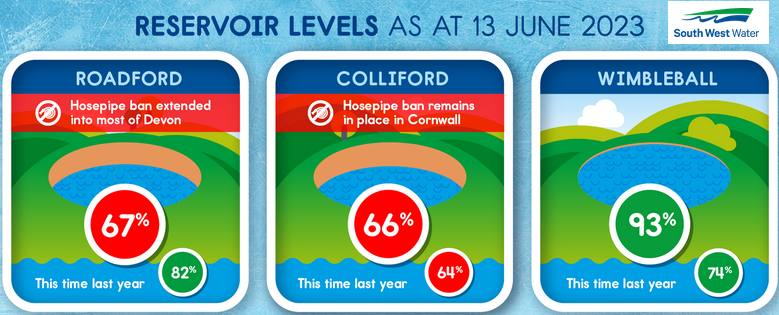
Winter was dry everywhere followed by a wet Spring 23 for southern Britain and Northern Ireland. NW Scotland was particularly dry during the spring months. With the recent dry, very warm weather there have been wildfires breaking out as soil moisture levels fell. River levels have been low here. For southern Britani there are healthier river flows and groundwater levels after the rain during winter and spring. This has helped replenish water resources in the southeast but we are heading into a time of high demand, high solar radiation on water bodies and lower seasonal rainfall.
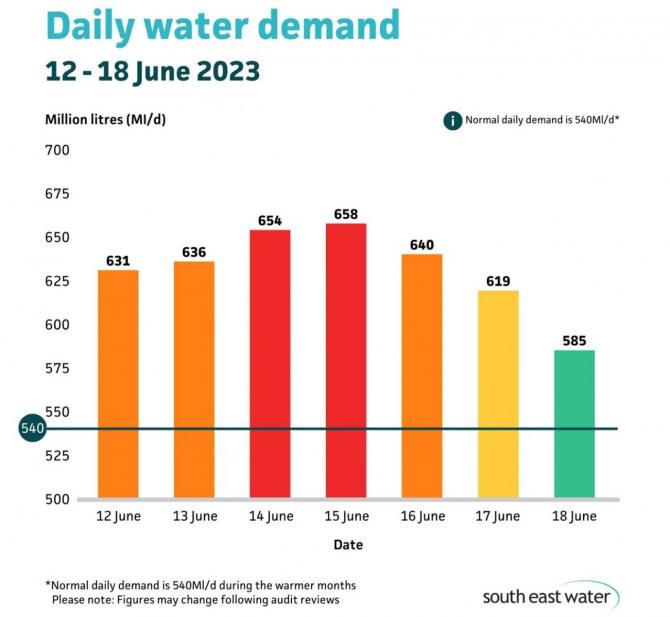
The demand for drinking water reached record levels in June in Kent and Sussex. This impacted the network of pipes that deliver water to customers taps, as local storage tanks began to see very low levels of water. The hot weather results in high demand, too high demand, so the restrictions are needed now.
“We need to be better prepared for future climate-driven drought, as well as learn from what we have already experienced. That is why government, regulators, water companies and all water users will continue to work together, using the latest science and best practice, to ensure our water resources are prepared for more extreme events in the future.” Environment Agency Chief Executive and National Drought Group Chair, John Curtin
“The water resource position of Welsh Water’s area of supply is relatively strong. Around 95% of our water resources originate as surface water either from reservoir storage or river abstractions. We have very little dependence on groundwater supplies. This reliance on surface waters can increase vulnerability to short periods of low rainfall as river levels change more quickly than groundwaters.”
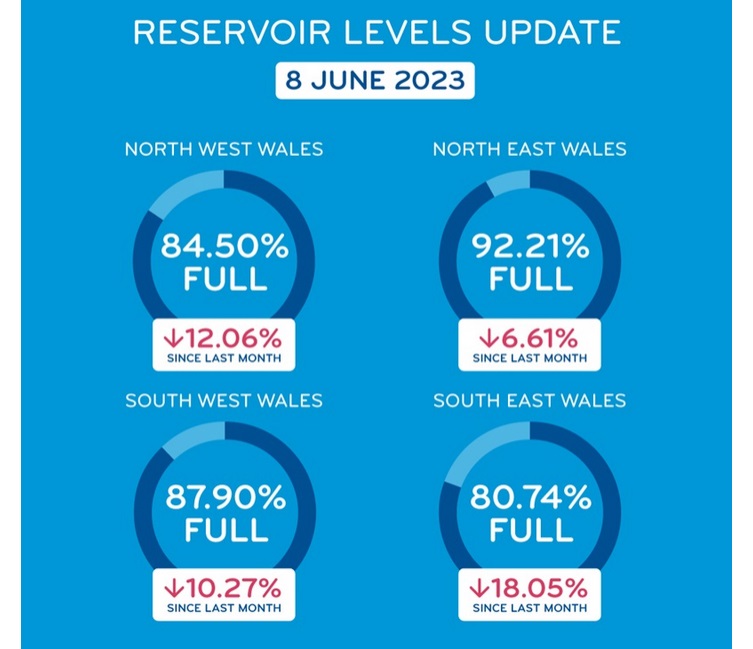
From the EA Weekly bulletin: Weds 7 June to Tues 13 June 2023. There is still great variation across England. “River flows have decreased at the majority of sites we report on with flows now ranging from notably high to exceptionally low for the time of year.”
There is no current threat of drought at present, but hosepipe bans are a way of helping the situation in hot summer weather.
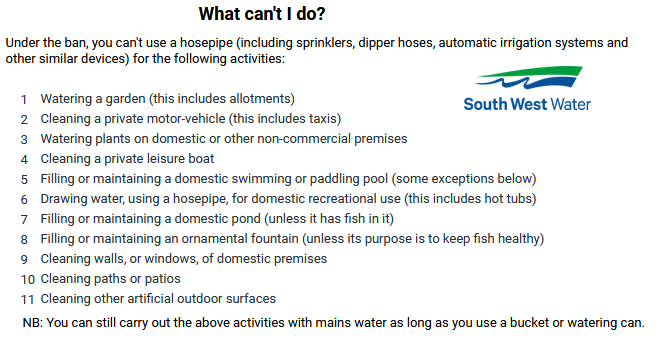
Next up from the Temporary Use Ban would be a Drought Order restrictions
These are considered if river flows and reservoirs continue to drop, resulting in less water being available. Drought orders would be applied for, to source more water from unused sources or sensitive locations. Fixing leaks is ongoing. The reasons for considering the next stage would be that reservoir levels were extremely low and to protect the supply of clean drinking water for all.
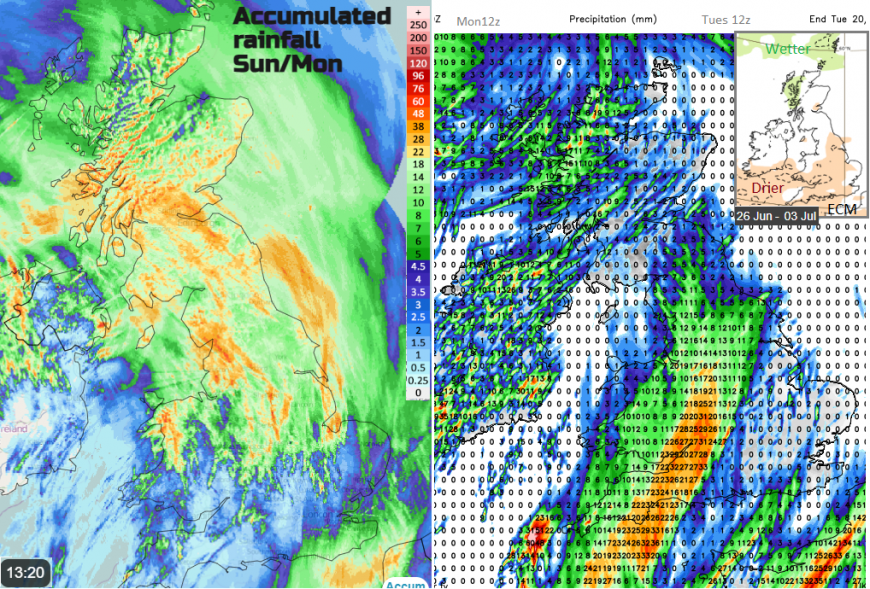
There is more rain this week with another pulse of heavy and thundery rain moving up from the south. Then the weather settles down again and could heat up next weekend, moving back towards 30C. Beyond that into the start of July, there looks to be settled dry weather for southern parts of the UK. Any thundery downpours will not dent the overall picture.
There is plenty of advice to reduce water usage, cut energy costs and help the situation. Water butts will collect rainwater in these downpours and then can be used directly in the garden. Grey water from sinks and saucepans, after cooking vegetables or pasta works too. Getting that annoying dripping tap fixed and when you are watering the garden with a watering can, doing it away from the midday sun. The evening is preferable. Also, climate action paths which look at hidden water usage, such as fast-fashion cotton production.
Waterwise has put the focus on being water efficient, so we only use the water we need and take steps to cut down 'water waste'. As Anglian Water say "Love every drop"
Loading recent activity...